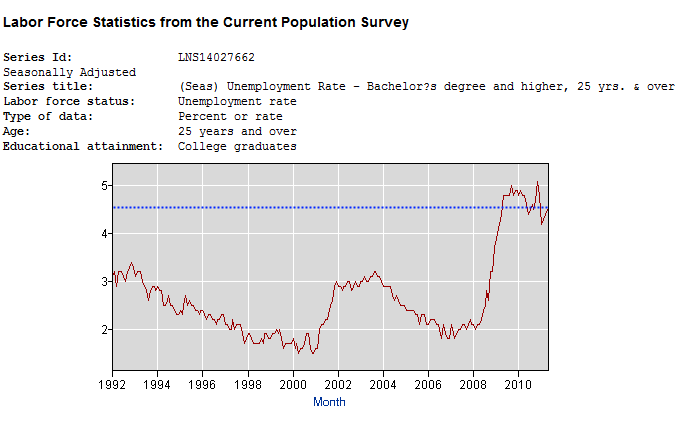Wall Street Journal
From an interview with Bob Funk, "the president and founder of Express Employment Services, the fifth-largest employment agency in America, with annual sales of $2.5 billion and more than 600 franchises across the country. This year he will place nearly half a million workers in jobs."
To land and keep a job isn't hard, he says, but you have to meet three conditions: "First you need integrity; second, a strong work ethic; and, third, you have to be able to pass a drug test." If an applicant can meet those minimal qualifications, he says, "I guarantee I can find employers tomorrow who will hire you."
...
The primary jobs problem today, Mr. Funk says, is that too many workers are functionally unemployable because of attitude, behavior or lack of the most basic work skills. One discouraging statistic is that only about one of six workers who comes to Express seeking employment makes the cut. He recites a company statistic that about one in four applicants can't even pass a drug test.
"In my 40-some years in this business, the biggest change I've witnessed is the erosion of the American work ethic. It just isn't there today like it used to be," Mr. Funk says. Asked to define "work ethic," he replies that it's fairly simple but vital on-the-job behavior, such as showing up on time, being conscientious and productive in every task, showing a willingness to get your hands dirty and at times working extra hours. These attributes are essential, he says, because if low-level employees show a willingness to work hard, "most employers will gladly train them with the skills to fill higher-paying jobs."
He fears that too many of the young millennials who come knocking on his door view a paycheck as a kind of entitlement, not something to be earned. He is also concerned that the trendy concept of "life-balancing" is putting work second behind leisure.
...
At any given time, Mr. Funk says, Express has as many as 20,000 jobs the company can't fill because workers don't have the skills required. His advice to young people who are looking for a solid career is to get training in accounting (thanks to Dodd-Frank's huge expansion of paperwork), information technology, manufacturing-robotics programming, welding and engineering. He's mystified why Express has so much trouble filling thousands of information-technology jobs when so many young, working-age adults are computer literate.
He blames public schools and universities for the skills mismatch. Young people looking for a financially secure future might want to heed one of his favorite pieces of cautionary advice: "If you've got a college degree in psych, poly-sci or sociology, sorry, I can't help you find a job." He urges greater emphasis on vocational and practical skills training in schools, universities and junior colleges.
I will say this, with some confidence -- If you are interested in welding, engineering, robotics programming, or accounting, the chances that you will make a good psychologist are slim-to-none. Does the world need more welders or more psychologists? Plainly, the former. Are colleges "overproducing" majors in psychology, political science, and sociology? Arguably, in that most of those graduates go on to work in careers not related to their undergraduate field of study. But college education is much more than vocational training, a point which Mr. Funk seems not to recognize.


No comments:
Post a Comment
Note: Only a member of this blog may post a comment.